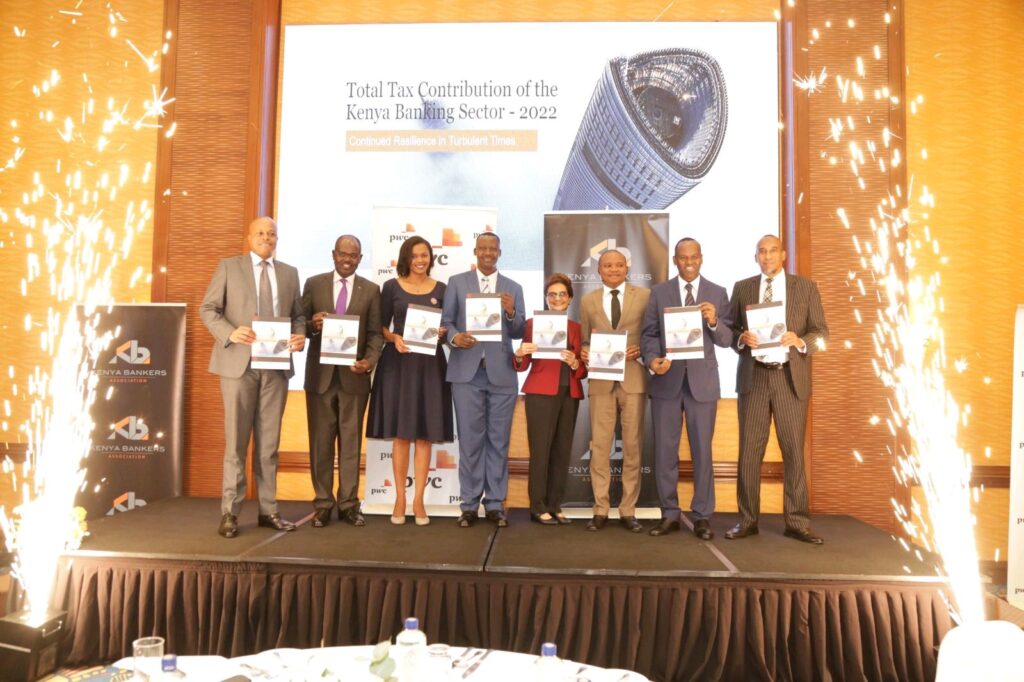
- Launch of the 2022 Kenyan Banking Sector Total Tax Contribution study by PwC and KBA
PwC Kenya in partnership with the Kenya Bankers Association (“KBA”) have released the 2022 Total Tax Contribution (“TTC”) study of the Kenya Banking Sector.
The TTC study was produced by PwC on behalf of KBA.PwC’s TTC methodology discloses both the taxes that a company bears, such as corporate tax and Value Added Tax (“VAT”) that it is not able to recover (irrecoverable VAT), and also the taxes that banks collect as an agent of government such as Pay-As-You-Earn (PAYE) and Excise Duty.
 The TTC methodology only accounts for taxes paid on a cash basis and does not take into account taxes accrued.
The TTC methodology only accounts for taxes paid on a cash basis and does not take into account taxes accrued.
The study offers an opportunity for the Total Tax Contribution of the banking sector to be quantified and analysed in order to facilitate data driven discussions and engagements with policy makers and regulators.
Peter Ngahu, PwC Kenya’s Country Senior Partner and Regional Senior Partner, Eastern Africa says, “This report provides valuable insight into how the Total Tax Contribution of the banks grew by 39.94% in 2022 relative to 2021”.
This was despite a challenging environment characterised by increased inflation, prolonged drought, depreciation of the Kenyan shilling against major currencies.
Other pressures included geopolitical tensions arising from the Russia-Ukraine conflict, and election-related uncertainties.”
The growth in Total Tax Contribution is primarily attributable to corporate tax due to an increase in the balance of tax (a type of corporate tax) paid in 2022 and an increase in 2022 instalment taxes (another type of corporate tax).

Both of these grew due to year-on-year growth in the sector’s profitability of 85% and 22% in 2021 and 2022 respectively.
Kenya Bankers Association’s Chief Executive Officer,Dr. Habil Olaka, notes that the financial services sector plays an important role in supporting economic growth.
 He says the banking industry remains committed to sustain efforts towards anchoring business growth despite geopolitical challenges and various adverse effects both in the global and domestic macroeconomic environment.
He says the banking industry remains committed to sustain efforts towards anchoring business growth despite geopolitical challenges and various adverse effects both in the global and domestic macroeconomic environment.
Dr. Olaka further notes, “This report continues to demonstrate high levels of transparency and compliance among banks, which highlights sound corporate governance.
There is no doubt that the TCC also underlines the industry’s collective commitment to transparency and tax compliance.
As an industry we are, therefore, happy that our members are at the forefront of tax transparency and compliance in the corporate sector.”
Key findings;
The TTC study shows that the 39 banks who participated in this study (representing 97.65% of the market share from a net asset perspective) made a Total Tax Contribution of KES 181.27 bn in 2022.
This is a 39.94% increase from the Total Tax Contribution of KES 129.52 bn made in 2021. The 2022 contribution is 8.93% of the total tax collections in Kenya compared to 6.8% in 2021.
This 8.93% contribution of the banking sector to the total tax collections in Kenya underscores the significant contribution of the banking sector to Kenya’s tax revenues.
Financial activities (including banking) contributed more than 5% to Kenya’s nominal GDP in 2022.
This underlines the government’s reliance on the highly formalised and regulated banking sector to not only spur economic growth but also pay its own taxes.
 Given this context, it is crucial for the tax policy framework of the sector to be designed in a way that facilitates sustainable growth,” commented Alice Muriithi, Partner at PwC Kenya and the lead technical advisor on the study.
Given this context, it is crucial for the tax policy framework of the sector to be designed in a way that facilitates sustainable growth,” commented Alice Muriithi, Partner at PwC Kenya and the lead technical advisor on the study.
The study also revealed that the Total Tax Rate,which is a measure of the ratio of all taxes borne relative to profitability, was 43.09%. This means that for every KES 100 of profits, banks paid KES 43.09 to the government as taxes.
The Total Tax Rate for the year 2021 was 32.85%. The high Total Tax Rate in 2022 was driven by the significant increase in corporate taxes, mentioned above.
The study further noted a 76.41% increase in Excise Duty collected by the banking sector.
This is the only tax analysed in this report that has nearly tripled over the past three years.
This is largely attributed to a wider scope for Excise Duty as per the Finance Act 2021 as well as a growth in non-funded income such as fees and commissions which are subject to Excise Duty.
“Between 2021 and 2022, Excise Duty experienced a remarkable growth rate of 60.13%.
This can be attributed to an increase in non-funded income (including fees and commissions) and an increase in the volume and value of digital transactions given the continued investments in technology.
The growth in Excise Duty is also attributed to the introduction of Excise Duty on fees and commissions on loans by the Finance Act, 2021 with effect from 1 July 2021 meaning that fees and commissions on loans were subject to Excise Duty for the entire 2022 financial year-compared to only half of the 2021 financial year,” says Alice Muriithi.
Further, input VAT expensed by banks (irrecoverable VAT) increased by 5.99% in 2022 compared to 2021.
Increase in commercial rent due to opening of new physical branches by the bank sector in 2022 meant that commercial rent expense incurred increased.
This led to higher irrecoverable VAT as commercial rent attracts VAT, but banks are not able offset the VAT incurred as the bulk of their income is VAT exempt.
Tax continues to increasingly be viewed as a key aspect of sustainability given the potential impact of taxes to achieve social economic cohesion and drive long term prosperity.
The Global Reporting Initiative (“GRI”) now has a standard for tax reporting known as GRI 207 which provides guidance on public tax reporting.
In addition, the Principles of Responsible Banking,Nairobi Securities Exchange(NSE) ESG Disclosures Guidance Manual (for listed banks) also provides a framework for public tax reporting.
Given the significance of taxes paid by banks in Kenya, there is sufficient impetus for individual banks to embark on the public tax transparency journey.














